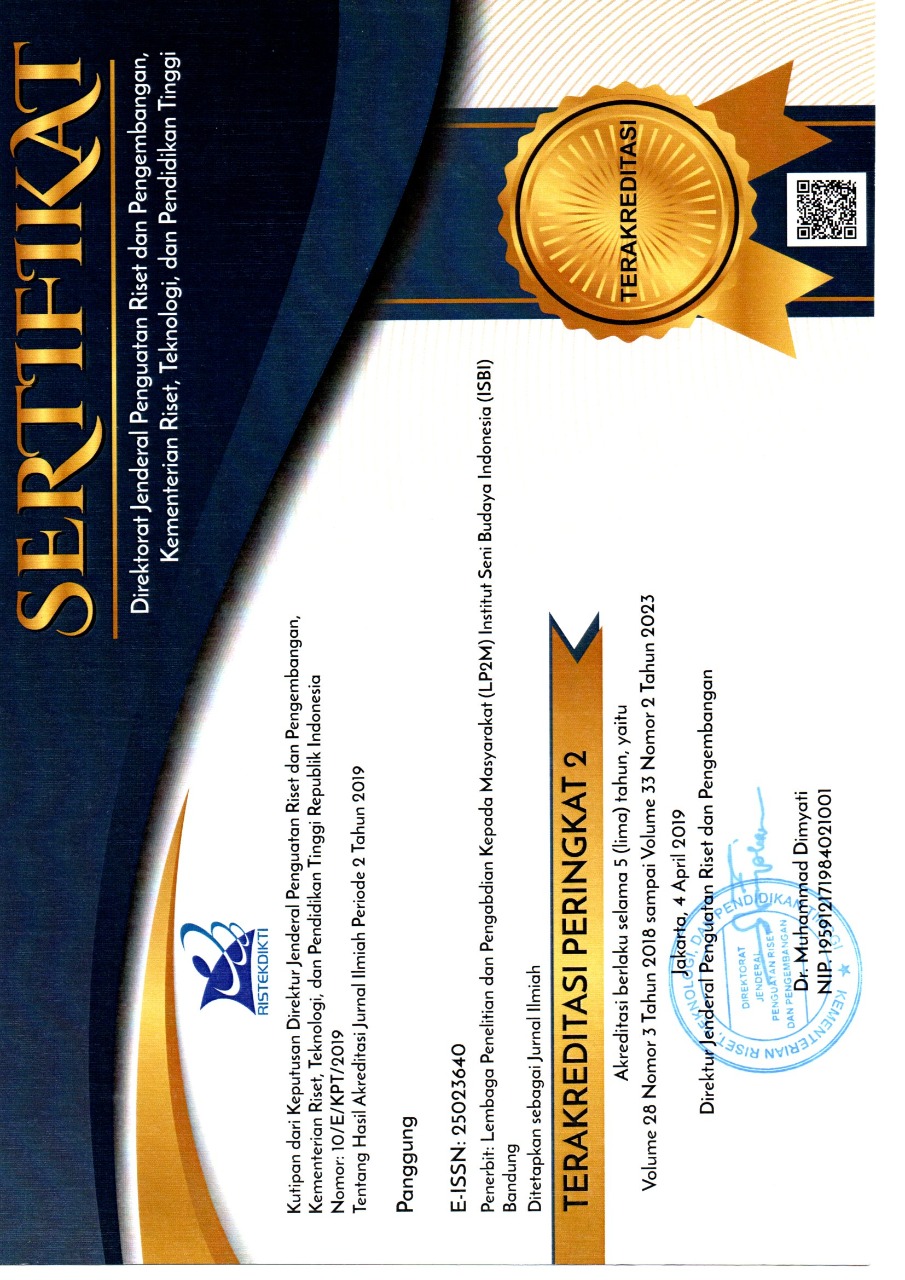Pertunjukan Liong dan Barongsai di Yogyakarta: Redefinisi Identitas Tionghoa
Abstract
ABSTRACT
┬Ā
Since the reformation era, the Indonesian Chinese get their rights as citizens of the nation of Indo┬Ł nesia. They earn the right to live as citizens as the other nations in Indonesia, including the practice of their religion and belief, as well as their culture. Nevertheless, political discrimination of the New Order government for three decades had created blockage impact on cultural transfer from one gene┬Ł ration to the next. Today, when they get their freedom, the process of commodification of culture also played a role in redefining their identity. This study aims at determining how they define their identity. This study used a qualitative descriptive approach. The technique of collecting data used literature study, observations and in┬Łdepth interviews. The result of the study shows that commo┬Ł dification of Chinese culture does not make the vanishment of their identity and culture, but it has strengthened the Chineseness and created the emergence of the new texts on Liong and Barongsai culture.
┬Ā
Keywords: Liong, Barongsai, redefinition of Chinese identity
┬Ā
┬Ā
ABSTRAK
┬Ā
Sejak lahirnya reformasi, orang Tionghoa Indonesia memperoleh hak mereka sebagai war- ga bangsa Indonesia. Hak hidup sebagaimana warga bangsa lainnya di Indonesia telah mereka peroleh kembali, termasuk menjalankan agama dan kepercayaan, serta budaya mereka. Namun demikian, kebijakan diskriminatif pemerintah Orde Baru selama tiga da- sawarsa berdampak pada tersumbatnya transfer budaya dari generasi ke generasi beri- kutnya. Kini, ketika kebebasan tersebut didapat, proses komodifikasi budaya juga ikut berperan dalam mendefinisikan identitas mereka kembali. Penelitian ini bertujuan untuk mengetahui bagaimana mereka mendefinisikan identitas mereka. Penelitian ini meng- gunakan pendekatan kualitatif deskriptif. Teknik pengambilan data menggunakan studi literatur, pengamatan dan wawancara mendalam. Hasil penelitian menunjukkan bahwa komodifikasi atas budaya Tionghoa tidak bermuara pada matinya identitas dan hilangnya kebudayaan Tionghoa, tetapi justru telah memperkuat ke-Tionghoaan dan juga muncul- nya teks-teks baru pada produk budaya Liong dan Barongsai.
┬Ā
Kata kunci: Liong, Barongsai, redifinisi identitas Tionghoa
Full Text:
PDFReferences
Barth, Fredrik.
ŌĆ£IntroductionŌĆØ dalam Fredrik Barth (ed). Ethnic Groups and Boundaries: The Social Organization of Culture Difference. Bergen-Oslo:
Carey, Peter.
Orang Jawa dan Masyarakat Cina
(1755-1825). Jakarta: Pustaka Azet.
Hari Porwanto.
Orang Khek di Singkawang: Suatu Kajian Mengenai Masalah Asimilasi Orang Cina Dalam Rangka Integrasi Nasional di Indonesia. Jakarta. Di- sertasi Doktor pada Universitas Indonesia.
I Wibowo.
ŌĆ£Sumbangan Masyarakat Cina bagi Pertumbuhan Kosa Kata Ba- hasa IndonesiaŌĆ£ dalam Basis edisi April 1986.
Leo Suryadinata.
Pribumi Indonesia: The Chinese Minority and China. Singapore. Hernemann Asia.
Maunati Yekti.
Identitas Dayak, Komodifikasi dan Politik Kebudayaan. Yogyakarta: LKiS.
Roberts, Jeremy.
Chinese Mythology A to Z. USA: Chelsea House Publishers.
Skinner, G.William.
Change and Persistence in Chinese Culture Overseas: A Comparation of Thailand and Java. Southeast Asia: The Politics of National Integration. John T.McAlister (ed). New York. Randon House.
Suhartono.
Weldon, Peter.
Indonesian and Chinese Status and Language Difference in Urban Java, Journal of Southeast Asian Studies, (V/1). Singapore. McGraw-Hill Far Eastern Publisher Ltd.
Wilmott, Donald E.
The Chinese of Semarang: A Changing minority community in Indonesia. Ithaca-New York. Cor- nell University Press.
.
The National Status of the Chinese in Indonesia 1900┬Ł1958. Modern Indonesia Project. Ithaca-New York. Southeast Asia Program Department of Far Eastern Stu-
DOI: http://dx.doi.org/10.26742/panggung.v23i2.99
Refbacks
- There are currently no refbacks.
Statistik Pengunjung Jurnal Panggung
ĀJurnal ini terlisensi olehĀCreative Commons Attribution-ShareAlike 4.0 International License.
Editor Office:
Lembaga Penelitian dan Pengabdian Kepada Masyarakat (LP2M)
Institut Seni Budaya Indonesia (ISBI) Bandung Gedung Rektorat Lantai 4
Jl. Buah Batu No. 212 Bandung 40116Ā
Email: penerbitan@isbi.ac.id or redaksi.panggung@gmail.com
Phone: 022 7314982 Fax: +022 7303021













